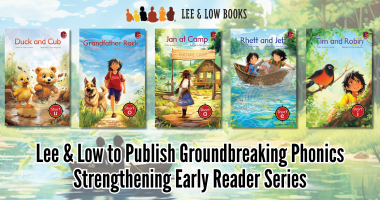The Washington Post and the Chicago Tribune recently interviewed Tu Books publisher Stacy Whitman and Lee & Low’s new editorial director, Cheryl Klein, in a piece discussing “sensitivity readers,” who read specifically to review the cultural and identity elements of a book for authenticity. Because not every answer to an interview question makes it into an article, we collected Stacy’s answers on why we consult with expert readers.
 While the term “sensitivity reader” was coined by YA writer Justina Ireland a few years ago—she maintains a database of readers who authors and publishers can consult—the concept of outside readers reading for authenticity is not a new one in publishing, though not always used for every book written cross-culturally.
While the term “sensitivity reader” was coined by YA writer Justina Ireland a few years ago—she maintains a database of readers who authors and publishers can consult—the concept of outside readers reading for authenticity is not a new one in publishing, though not always used for every book written cross-culturally.
Here at Lee & Low, it’s a standard practice to consult what we usually refer to as “cultural experts,” because we’re seeking out someone who both understands children’s literature and who is enough of an expert to guide our authors who are writing cross-culturally.
Lee & Low has been publishing diverse books for more than 25 years, and our staff is quite diverse. When we have a question about a manuscript that cannot be answered by someone in-house, we have relationships with a wide variety of people from many different cultures and backgrounds. When we have a book outside the author’s experience culturally (or outside their experience of identity, as with an LGBT character), we look at who we know who might be an expert in the subject, and then network from there to find someone who is a good fit.
When sensitivity readers are part of the writing process, they serve more as beta readers. As part of the editorial process, cultural experts are different from beta readers—we are asking them as an expert to evaluate the manuscript on a particular subject, not give overall feedback. The scope of an expert’s feedback varies depending on the amount of cultural content in the book and how that content interacts with the rest of the story.
Why we do this seems obvious to us—because it creates a better book in the end. As Daniel José Older says, quoting Kwame Dawes, “Racist writing is a craft failure.” If we published books that had racist representations, stereotypes, or other kinds of lazy writing, we would be failing our duty as a publisher.
Our motto as a publisher is “about everyone, for everyone.” This is accomplished by first seeking out voices from underrepresented communities so they can speak for themselves, of course. But when we are publishing a book by someone from outside a community, good craft demands that we consult members of the community for review.
Stacy Whitman is Editorial Director and Publisher of Tu Books, an imprint of LEE & LOW BOOKS that publishes diverse middle grade and young adult titles.









